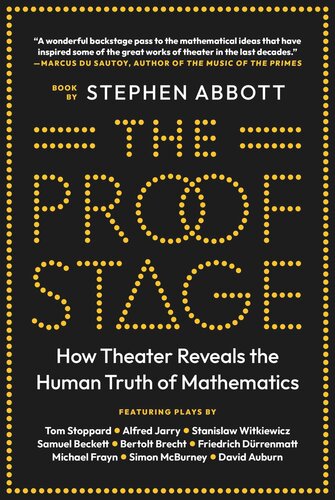

Most ebook files are in PDF format, so you can easily read them using various software such as Foxit Reader or directly on the Google Chrome browser.
Some ebook files are released by publishers in other formats such as .awz, .mobi, .epub, .fb2, etc. You may need to install specific software to read these formats on mobile/PC, such as Calibre.
Please read the tutorial at this link: https://ebookbell.com/faq
We offer FREE conversion to the popular formats you request; however, this may take some time. Therefore, right after payment, please email us, and we will try to provide the service as quickly as possible.
For some exceptional file formats or broken links (if any), please refrain from opening any disputes. Instead, email us first, and we will try to assist within a maximum of 6 hours.
EbookBell Team

5.0
58 reviewsHow playwrights from Alfred Jarry and Samuel Beckett to Tom Stoppard and Simon McBurney brought the power of abstract mathematics to the human stage
The discovery of alternate geometries, paradoxes of the infinite, incompleteness, and chaos theory revealed that, despite its reputation for certainty, mathematical truth is not immutable, perfect, or even perfectible. Beginning in the last century, a handful of adventurous playwrights took inspiration from the fractures of modern mathematics to expand their own artistic boundaries. Originating in the early avant-garde, mathematics-infused theater reached a popular apex in Tom Stoppard’s 1993 play Arcadia. In The Proof Stage, mathematician Stephen Abbott explores this unlikely collaboration of theater and mathematics. He probes the impact of mathematics on such influential writers as Alfred Jarry, Samuel Beckett, Bertolt Brecht, and Stoppard, and delves into the life and mathematics of Alan Turing as they are rendered onstage. The result is an unexpected story about the mutually illuminating relationship between proofs and plays—from Euclid and Euripides to Gödel and Godot.
Theater is uniquely poised to discover the soulful, human truths embedded in the austere theorems of mathematics, but this is a difficult feat. It took Stoppard twenty-five years of experimenting with the creative possibilities of mathematics before he succeeded in making fractal geometry and chaos theory integral to Arcadia’s emotional arc. In addition to charting Stoppard’s journey, Abbott examines the post-Arcadia wave of ambitious works by Michael Frayn, David Auburn, Simon McBurney, Snoo Wilson, John Mighton, and others. Collectively, these gifted playwrights transform the great philosophical upheavals of mathematics into profound and sometimes poignant revelations about the human journey.